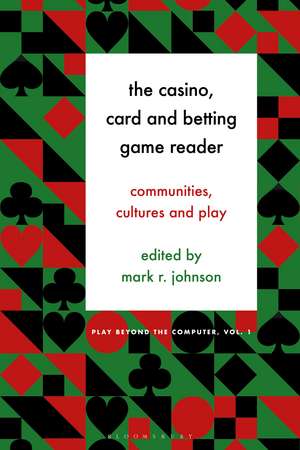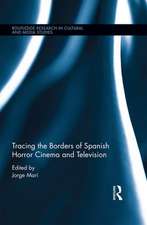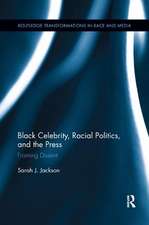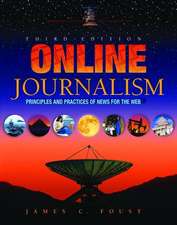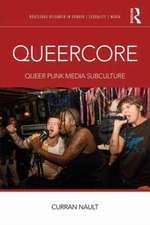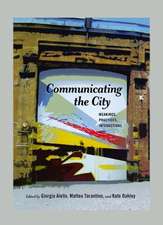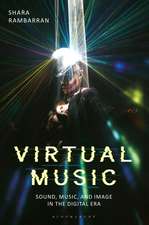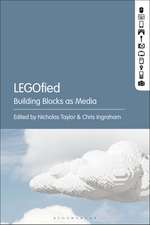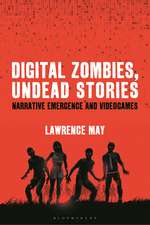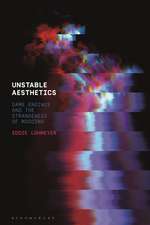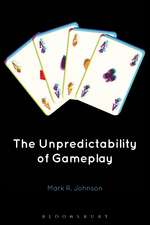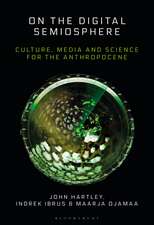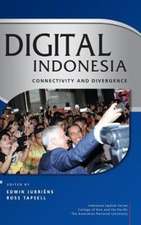The Casino, Card and Betting Game Reader: Communities, Cultures and Play: Play Beyond the Computer
Editat de Dr. Mark R. Johnsonen Limba Engleză Hardback – 29 dec 2021
| Toate formatele și edițiile | Preț | Express |
|---|---|---|
| Paperback (1) | 197.87 lei 6-8 săpt. | |
| Bloomsbury Publishing – 26 iul 2023 | 197.87 lei 6-8 săpt. | |
| Hardback (1) | 681.77 lei 6-8 săpt. | |
| Bloomsbury Publishing – 29 dec 2021 | 681.77 lei 6-8 săpt. |
Preț: 681.77 lei
Preț vechi: 1201.17 lei
-43% Nou
Puncte Express: 1023
Preț estimativ în valută:
130.46€ • 142.15$ • 109.93£
130.46€ • 142.15$ • 109.93£
Carte tipărită la comandă
Livrare economică 23 aprilie-07 mai
Preluare comenzi: 021 569.72.76
Specificații
ISBN-13: 9781501347252
ISBN-10: 150134725X
Pagini: 512
Ilustrații: 21 bw illus
Dimensiuni: 152 x 229 mm
Greutate: 0.85 kg
Editura: Bloomsbury Publishing
Colecția Bloomsbury Academic
Seria Play Beyond the Computer
Locul publicării:New York, United States
ISBN-10: 150134725X
Pagini: 512
Ilustrații: 21 bw illus
Dimensiuni: 152 x 229 mm
Greutate: 0.85 kg
Editura: Bloomsbury Publishing
Colecția Bloomsbury Academic
Seria Play Beyond the Computer
Locul publicării:New York, United States
Caracteristici
Includes insights from practitioners, providing unique first-hand insights into these domains of play, offering reflexive and autoethnographic perspectives on game practices and communities
Notă biografică
Mark R Johnson is a Lecturer in Digital Cultures at the University of Sydney, Australia. His work is focused on video game live streaming on Twitch.tv, as well as esports and competitive gaming, gamblification and digital gambling, procedural content generation, and game design. He is also an independent game developer noted for the game Ultima Ratio Regum, and a regular games writer, blogger, and podcaster.
Cuprins
List of Illustrations List of Contributors1. Why Study Games and Money?(Mark R. Johnson, University of Sydney, Australia)Part I: Foundations2. Gambling games, money and late capitalismJames F. Cosgrave (Trent University, Canada)3. To skill, perchance to win: How chance and skill have co-existed in gambling historyDavid S. Schwartz (University of Nevada, Las Vegas, USA)Part II: Poker4. 'An hour's commercial for the Horseshoe': Popular memory, sports television and the World Series of PokerAlexander Kupfer (Vassar College, USA) 5. Be a Pal: Women's intrusions into men's poker play on TV sitcoms Danielle Seid (University of Hawai'i at Manoa, USA) 6. Poker fiction: Romance, possible worlds and magic circlesPaul Wake (Manchester Metropolitan University, UK) Part III: Money and class 7. Cards, banking games and the normalization of financeJoyce Goggin (University of Amsterdam, the Netherlands) 8. 'Pitch and toss': Casinos of hope and despair in working-class BritainGraham Taylor (UWE, Bristol, UK) 9. Selves in play: Pop-up casinos and discontinuous persons in Greece Thomas Malaby (University of Wisconsin-Milwaukee, USA) 10. Honourable risks and dishonourable certainties: Naiveté and cynicism at play over the card table in Imperial RussiaIan Helfant (Colgate University, USA) Part IV : Casino cities 11. Monte Carlo's wheel of fortune: The social impact of risk, reward and roulette on visitors to Monaco's legendary casino, 1863-1914Robert W. Miller (University of Kansas, USA) 12. Gambling in the kitchen: Monte Carlo from the nineteenth to the mid-twentieth centuryPaul Franke (Humboldt-University of Berlin, Germany) 13. What statistics don't say: Game innovation in Macau's casinos since 2002Xavier Paulès (Ecole des Hautes Etudes en Sciences Sociales, France)14. Playing with heritage : Gambling and Venice's traditionMarta Soligo (University of Nevada, Las Vegas, USA) 15. Locating Native American gambling traditions in contemporary Indian casino gamingLaurie Arnold (Gonzaga University, USA) 16. On the infrastructure of gaming: The case of pachinko Keiji Amano (Seijoh University, Japan) and Geoffrey Rockwell (University of Alberta, Canada) 17. An enchanting witchcraft: Masculinity, melancholy and the pathology of gaming in early modern LondonCeleste Chamberland (Roosevelt University, USA) 18. Everyday casinos: The expanding gambling landscape in America's neighbourhoodsRex J. Rowley (Illinois State University, USA) 19. The market in the conclave: Gambling on election outcomes in Renaissance ItalyJohn M. Hunt (Utah Valley University, USA) 20. Eighteenth-century lotteriesMathias Fuchs (Leuphana UniversityLüneburg, Germany) Part VI: Cinema, art, literature and culture21. 'Whiskey, women, and loaded dice': The images and places of gambling in popular musicMatias Karekallas (University of Tampere, Finland) 22. From parasite to anti-hero: Shifting depictions of the card sharpJames Banks (Sheffield Hallam University, UK) 23. Gambling ladies: The games that Barbara Stanwyck playsCatherine Russell (Concordia University, Canada) Part VII: Insiders 24. The poker economy: The skill gap problem and the lifecycle of PvP gamesJeffrey Hwang (Independent Scholar, USA) Index
Recenzii
Mark Johnson has collected a valuable primer of identities, cultures, and interactions in game and gambling play in The Casino, Card and Betting Game Reader. This collection is a must-read for anyone curious about the role of money in ludic activities across time and space.
At a moment when "gamification" has become a marketing buzzword, this volume of essays is as illuminating as it is essential. The rich historical, socio-cultural and subcultural knowledge in this edited collection provides a genuinely new lens through which to understand enduring and diverse connections between games and money in spaces of everyday life.
At a moment when "gamification" has become a marketing buzzword, this volume of essays is as illuminating as it is essential. The rich historical, socio-cultural and subcultural knowledge in this edited collection provides a genuinely new lens through which to understand enduring and diverse connections between games and money in spaces of everyday life.
